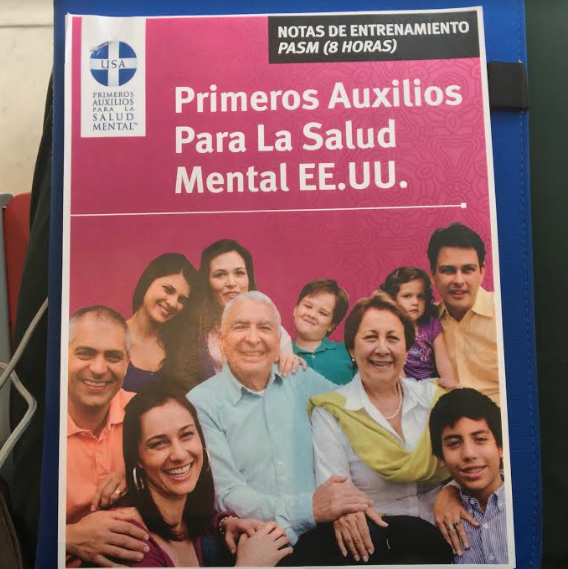Dear Homeslice,
Congrats on making it through another week in this hateration-filled dancerie. Welcome to another Monday and to round of Mental Health Monday, your weekly dose of stories, resources, and motivation for your everyday life. On last week's party, we had some goodness from rapper Vic Mensa about how social media affected his mental wellness and why we have to open up about our struggles, how racial trauma affects our collective mental health, podcasts by therapists of color, and much more. Check it out.
If you're not listening to the Therapy for Black Girls podcast, with psychologist Dr. Joy Harden Bradford, there's still time to fix your life. The show is a weekly conversation "about all things mental health, personal development, and all the small decisions we can make to become the best possible versions of ourselves." Because she's awesome, Dr. Joy has a dope directory of, you guessed it, therapists for Black girls. On her most recent episode, she and therapist Kiaundra Jackson, LMFT, discussed healthy relationships and you're in luck because you can listen to it right here:
THIS WEEK'S GOODNESS:
In honor of Minority Mental Health Awareness Month, now's a good time to take a look at Dr. Jessica Dere's TEDx talk about how considering cultural factors (traditions, family dynamics, immigration, religion, etc.) when approaching one's mental health. A "one size fits all" approach to wellness overlooks so many important elements of one's situation and personality.
"Meet 3 20-Somethings Making It Easier For Black Millennials To Talk About Depression" by Zahara Hill [HuffPo]
So contrary to the old folks’ adage, black people living with depression aren’t doing so because they’ve been afforded the luxury of having “white people problems.”
Thankfully, a number of creative black 20-somethings with mental illnesses are addressing the stigma that surrounds it. But three, in particular, have stood out for the unique ways they’re going about furthering the mental health dialogue.
"Rap’s Biggest Stars Are Depressed & So Are Their Fans" by Morgan Olsen [DJ Booth]
We sing along at the top of our lungs to Lil Uzi Vert's hit single “XO Tour Llif3,” chanting, “She said I’m insane yeah, I might blow my brains out. Xanny for the pain yeah, please Xanny make it go away.” This song is all over the radio. Yet, we gloss over the fact that Uzi is quite possibly hanging on for dear life, taking Xanax to numb the pain while thoughts of taking his own life run through his head.
"How My Father Taught Me to Be a Man" by Clay Cane [Advocate]
I became seriously introverted. I was afraid to speak or move too suddenly and was in a state of constant nervousness. There was no space to be myself. I was labeled a “nervous child,” but no one understood that my father kept me on a choking, hypermasculine leash. I’d practice masculinity in the mirror. Trying to move my hands the “right” way, pacing my steps so I wasn’t “swishing”; studying masculinity was my survival technique to endure the mental abuse from my father.
"Is there institutional racism in mental health care?" by Isaac Fanin [BBC]
When Eche Egbuonu, who has bipolar disorder, was sectioned under the Mental Health Act, he should have been taken to a safe environment - usually a hospital - for a medical assessment.
Instead, he was taken straight to a police station.
"“Strong as Glass” Erasing the Stigma of Mental Illness & Black women" by Abesi Manyando [Think Pynk]
When asked to imagine mental health in the black community, many people could probably envision a brick wall between themselves and the person they are trying to confide in. It’s a widely known stereotype that topics like depression and suicide are “white people things” or that mental illnesses will just pass on like a common cold. As Black women we’ve been taught that we have super powers and strength unknown to regular human beings.
"You’re Not White… And Other Reasons Black People Don’t Go to Therapy" by Esther Boykin [Psyched]
But this particular friend has always been my partner in the unspoken battle to win over our little pocket of the black community to the benefits of therapy. So when my friend’s daughter shared that she had visited a therapist on campus I was thrilled—not because of the pain this young woman was experiencing, but because she felt comfortable talking openly about it with her parents and the rest of us in the room. My heart leapt with pride and hope about how far we had come in our attitudes toward mental health.
But then my friend, my partner in expanding our community’s view of mental health, said, “Why? You’re not white. And you don’t have any real problems. What do you have to go to therapy for? These suburban kids are so soft… you don’t know what problems are.
RESOURCES
Depression, PTSD, & Other Mental Health Conditions in the Workplace: Your Legal Rights [EEOC]
Have a mental health story, video, resource, or event we need to know about? Don't be stingy. Send it our way!










Mental Health First Aid teaches ye to recognize signs and symptoms of someone developing a mental health or substance use disorder and a five-step action plan to help.